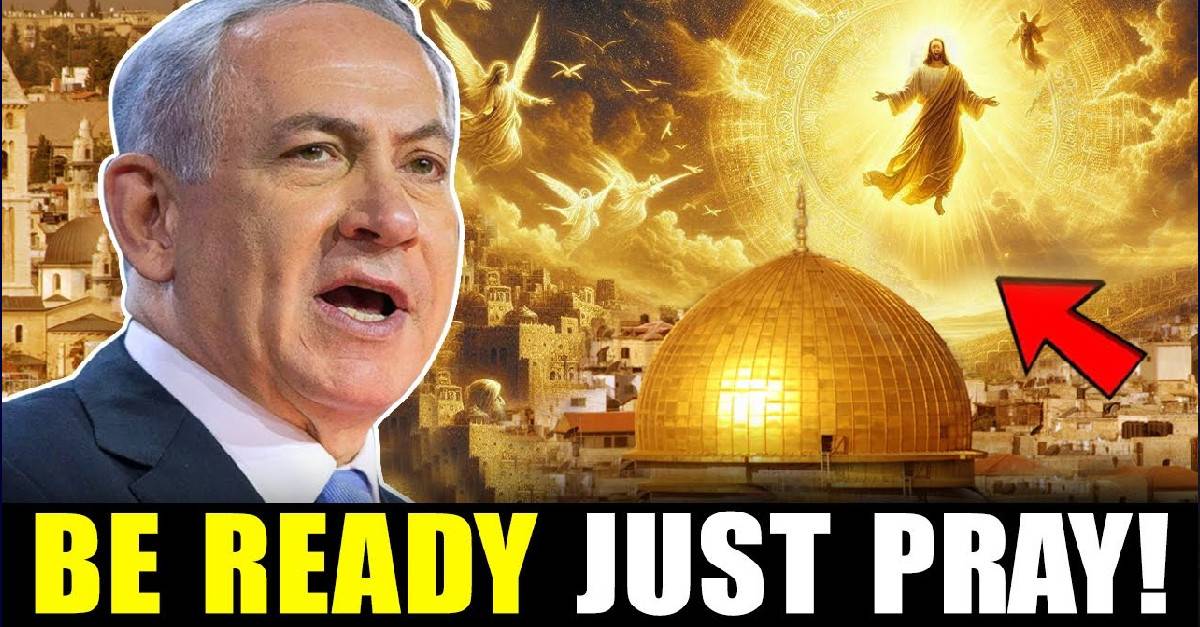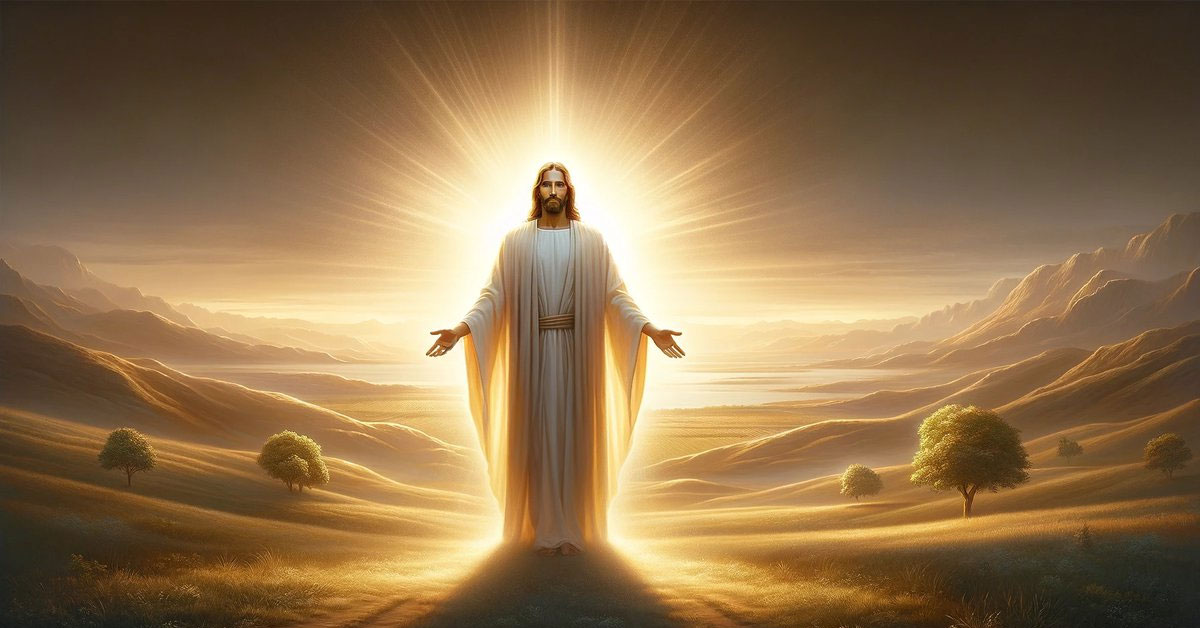In the ancient and sacred city of Jerusalem, where every stone echoes with history and every shadow bears the weight of prophecy, a profound and transformative event unfolded. Benjamin Netanyahu, the resolute leader of Israel, found himself consumed by the demands of his role, poring over national security documents late into the night. Beyond his windows, the holy city glittered under a canopy of stars, serene yet ever watchful. This night, however, was destined to be anything but ordinary.

As Netanyahu reviewed the stack of documents, a strange feeling crept over him. It wasn’t fatigue; it was something deeper, something that tugged at him, urging him to step away. Almost instinctively, he obeyed the call, retreating into stillness and prayer. The words of scripture surfaced in his mind, a familiar source of comfort: “He who keeps Israel neither slumbers nor sleeps.” He closed his eyes, seeking clarity, but instead, the world around him vanished.
In its place came a light, impossibly bright yet strangely calming, surrounding him completely. When the light softened, he found himself no longer in his office but standing in an endless valley, vast, barren, and hauntingly quiet. The air seemed charged, alive with something he couldn’t name. Far off, a figure appeared, glowing with a light that was not of this world. The figure didn’t move but seemed to be waiting, radiating a sense of purpose that reached across the valley. Then a voice spoke, loud and rich, and in that moment, everything changed.
“Benjamin,” the voice echoed, powerful and full of authority. “I am the one who has guarded this land since the beginning of time. You are the leader of Israel, but your role is greater than governing. You are called to be a witness to the signs of the times, a herald for my people.”

Netanyahu felt his heart pound as never before. He recognized the voice as something divine, something that could not be ignored. The figure continued, “Look at what is before you.” Netanyahu turned and saw a terrifying sight: nations gathering against Israel, armies marching, and chaos spreading like a dark cloud over the Earth. Among the hostile nations, he saw alliances that seemed impossible, all of them turned against his chosen people.
“This is what is coming,” the figure said. “The time of the prophecies is being fulfilled. The battle of Armageddon is approaching, as it is written: ‘And they gathered them together into the place called in Hebrew, Armageddon.’”
Netanyahu’s heart raced, but the figure reassured him, “Do not fear, for I am the Lord, and my word stands firm. Those who trust in me will be protected.”
As the vision continued, Netanyahu saw something that brought hope amid the terror. In the sky, an even brighter light appeared, and with it, a host of angels. In the center was a resplendent figure clothed in glory, whom he recognized as the Messiah. “I will return,” said the Messiah, “and my foot will tread on this mountain, as I promised. In that day, his feet will stand on the Mount of Olives, which faces Jerusalem on the east.”
Netanyahu fell to his knees, overcome with reverence. He knew he was called to prepare his people not just for political battles but for something much greater: the fulfillment of God’s plan. When the vision faded, he found himself back in his office, but something inside him had changed forever.
The next day, Netanyahu called a special meeting with his spiritual advisers and Israel’s religious leaders. He shared his experience with deep emotion. Some listened with skepticism, others with fear, but all felt the weight of the words of a man who had had a direct encounter with the divine.
“I am not here just as a political leader,” Netanyahu said. “I am here as a servant of Israel and a witness of what is to come. We need to turn to God because the times ahead will be challenging, but the Lord has promised, and it shall come to pass, that everyone who calls on the name of the Lord shall be saved.”
From that day forward, Netanyahu devoted himself not only to politics but also to promoting a spiritual calling in Israel. He sought to prepare the nation for the fulfillment of prophecy by leading with faith and courage. He knew the challenges would be great, but he also knew that God’s hand was upon Israel, as it always had been.
Tensions among nations had reached a boiling point, and Netanyahu was acutely aware that Israel stood at the center of a prophetic storm. That night, as he sat in silent meditation, something extraordinary occurred. A divine presence enveloped him, a feeling so profound it was as though the Lord himself was beside him, speaking directly to his soul. Suddenly, a vision overwhelmed him. The heavens parted, and a thunderous voice declared, “Benjamin, listen. Hear the word of the Lord of hosts. The time draws near. The war to end all wars is coming, when all nations will rise against Israel, as it is written: ‘When the thousand years are ended, Satan will be released from his prison and will go out to deceive the nations in the four corners of the earth, Gog and Magog, to gather them for battle.’”
Netanyahu knew this was no dream; it was God himself revealing the fate of his nation. A deep awe mixed with the weight of responsibility settled over him, especially when the Lord spoke of something called “Wilson’s Arch.” The meaning was unclear, but Netanyahu sensed it was tied to a prophecy on the brink of fulfillment.
Over the next days, as he prayed and sought understanding, the pieces began to come together. Wilson’s Arch was both a symbol of Israel’s past and a key to its prophetic future, a connection between history and destiny. He recalled an old prophecy mentioning this arch as a harbinger of great trials and triumphs to come.
Then the attack happened. In the dark hours of a morning, air raid sirens shattered the silence. Iran had launched 300 missiles aimed directly at Israel. For a moment, Netanyahu froze. The scale of the attack was unprecedented, dwarfing anything Israel had ever faced. The Iron Dome roared into action, but the sheer number of missiles threatened to overwhelm it. In the crisis room, Netanyahu watched the screens showing the assault in real time. His mind raced back to the Lord’s words. Was this the beginning of the foretold battle? Was this the moment described in Revelation when the nations would gather against Israel?
Drawing strength from God’s promises, he clung to the words: “Fear not, for I am with you. Be not dismayed, for I am your God. I will strengthen you. I will help you. I will uphold you with my righteous right hand.”

As chaos unfolded, Netanyahu called his military and spiritual advisers together. His voice carried both urgency and an unshakable resolve. “This is not only a physical battle; it is spiritual warfare. We are fighting against forces far beyond what we can see, a struggle between light and darkness, as foretold.”
Explosions lit up the sky, the terror of war stark and undeniable. Yet, in the midst of destruction, Netanyahu saw what could only be described as divine intervention. Many missiles were intercepted, and others seemed to veer off course as though an invisible force shielded the nation. “It is the Lord Almighty who fights for us,” Netanyahu declared, his faith unwavering in the face of an ominous reality.
As calm returned to the nation, Netanyahu addressed the people in a live broadcast. His voice was steady yet charged with emotion. The weight of the moment seemed to infuse every word. “People of Israel,” he began, his tone both resolute and reverent, “we are living in times of prophecy. The Lord has shown me what lies ahead. The nations will rise against us, but do not fear, for he has promised us this: ‘I will fight against your enemies and I will save your children.’”
He spoke of Wilson’s Arch, its name now heavy with meaning. “This is not merely a symbol of history; it is a sign for our future. It stands as a bridge between what was and what will be, a testament to the plans God has for us.”
His words carried an undercurrent of defiance against the tide of adversity. “This war,” he said with conviction that reached beyond the screen, “is not the end. It is the dawn of something greater. The Lord’s purpose for Israel remains unbroken and unshaken.”
Around the world, reactions came swiftly. Some nations condemned Iran’s attack; others chose silence, their inaction speaking volumes. Netanyahu, however, knew this was just the opening salvo. The battle was not only physical; it was spiritual, a war waged in realms unseen. He sought the Lord’s guidance as he prepared to lead with courage, knowing the days ahead would test them all.
To Netanyahu, the missile strike was more than an act of aggression; it was a signal, an awakening. Wilson’s Arch, the miraculous protection of the nation, and the divine words he had heard all converged into one undeniable truth: prophecy was unfolding before their eyes.
Late one evening, in the stillness of his Jerusalem office, Netanyahu felt the city’s ancient pulse, a quiet but persistent rhythm echoing with promises made long ago. The weight of his role pressed heavily on him, yet he felt a strange peace, knowing he was part of something far greater. In prayer, the presence came again. It wrapped around him, not in words but in a stillness that stilled even his doubts. Then a voice spoke to his soul, each word as clear as if it had been etched into the air.
“Benjamin, the time is near. The nations will rise against Israel, but my plans for my people will not be shaken.”
The message was brief yet carried the depth of eternity. Netanyahu trembled not in fear but in awe. He knew God’s ways often revealed themselves piece by piece, like fragments of a greater tapestry, as the Apostle Paul had written: “For we know in part and we prophesy in part.”
This was another piece of that divine puzzle, one that both burdened and elevated him. His role was no longer simply to lead but to stand as a steward of prophecy, carrying the weight of Israel’s destiny on his shoulders. In the days that followed, the words “Wilson’s Arch” clung to Netanyahu’s mind, refusing to let go. He dove into its history, uncovering its place in ancient Jerusalem, a bridge once connecting the sacred Temple Mount to the upper city. It wasn’t just stone and structure; it was a symbol, a bridge between heaven’s purpose and earth’s reality, a memory stirred within him.
Years ago, a prophetic word had mentioned Wilson’s Arch as a sign pointing to a moment when its meaning would become clear. Netanyahu realized that moment was now. This was more than a historical relic; it was a call from God, a signal to believers everywhere that a pivotal time was at hand. As Paul had written, “Follow the way of love and eagerly desire gifts of the Spirit, especially prophecy.”
This revelation wasn’t only for him; it was for all who had ears to hear. Netanyahu gathered his most trusted advisers and spiritual leaders in a quiet chamber. He shared the vision and the word he had received. “The nations will gather against us,” he began, his voice steady with conviction, “but Wilson’s Arch is a sign. It represents a connection between our history and the promises yet to be fulfilled. Israel is that bridge, a nation standing between heaven and earth.”
He quoted scripture to anchor their faith: “Though the mountains be shaken, my covenant of peace will not be removed.” Netanyahu urged unity and action. “This word is not for me alone; it’s for Israel and for believers around the world. We must prepare, pray, and stand firm as God’s people.”
The room was heavy with silence, the gravity of his message sinking in. Netanyahu’s voice carried not just authority but purpose, more than a leader; he was now a vessel for something greater. In the weeks that followed, Netanyahu carried an urgency he couldn’t ignore. His speeches shifted, taking on a weight that felt deeply personal.
“We are not here by chance,” he said in a live address. “The God of our ancestors, Abraham, Isaac, and Jacob, has carried us to this moment. As he was faithful before, so he will be faithful again.”
Wilson’s Arch began to take on a life of its own in his words. To Netanyahu, it wasn’t just an ancient structure; it was a metaphor, a bridge connecting history with destiny. “This arch reminds us that the past is not separate from the future,” he explained. “It calls us to draw strength from where we’ve been even as we walk toward what’s promised.”
His conviction was not just political rhetoric; it was rooted in something deeper. He leaned heavily on the promise of scripture: “For I know the plans I have for you, declares the Lord, plans to prosper you and not to harm you, plans to give you hope and a future.”
Then one quiet evening in prayer, a vision came to him, so vivid it left him breathless. He saw Wilson’s Arch shining, its stones lit from within by a glow that was unmistakably divine. He had passed it many times, but now it seemed alive with meaning. In the stillness of his spirit, he heard the Lord’s voice: “This arch is like the prayers of my people. It holds up this nation, carrying it through the storms that are yet to come.”

The words humbled him. Netanyahu realized that the prayers of believers, those whispered in solitude or cried out in desperation, were an unseen power as vital to Israel’s survival as any defense system. Just as the arch had once supported a bridge to the Temple Mount, so these prayers held Israel steady against forces both seen and unseen.
In the days that followed, Netanyahu began to see patterns, prophetic warnings he’d heard aligning with the violence now sweeping across Israel. These events were sobering but also affirmed his belief that God was moving even in the chaos. When Netanyahu addressed the nation, his words carried the weight of both challenge and hope.
“These are difficult times,” he acknowledged, his voice steady but filled with compassion. “But this is not the end. The Lord has promised to be with us through every trial, as it is written: ‘When you pass through the waters, I will be with you, and when you pass through the rivers, they will not sweep over you.’”
He cautioned against jumping to conclusions. “It’s easy to look at these events and think we are at the final chapter,” he said. “But the Lord’s plans are not for us to rush or define. We must wait, trust, and remain faithful, knowing his timing is perfect.”
October 7th started unremarkably but ended as a day Israel would never forget. The wail of emergency sirens pierced the air as reports confirmed the unthinkable: 300 missiles fired from Iran, all aimed at Israel. Netanyahu stood motionless for a moment, absorbing the gravity of the attack. This wasn’t just an escalation; it was a calculated assault designed to overwhelm even Israel’s formidable defenses like the Iron Dome.
In the crisis room, surrounded by advisors and screens flickering with updates, Netanyahu’s thoughts turned inward. Is this the moment God spoke of? Is prophecy unfolding before my eyes? Wilson’s Arch, a relic of history, suddenly felt urgent and alive in his mind, a symbol of the prayers that had always sustained Israel.
Later that day, Netanyahu convened his closest advisers and spiritual leaders. His voice was steady but charged with a deeper urgency. “This is bigger than missiles or defense systems,” he said. “The Lord revealed the importance of prayer, and now I see why. Wilson’s Arch isn’t just history; it’s a reminder. The prayers of God’s people hold this nation together, and without them, we will falter.”
He met their eyes one by one, allies may waver, diplomacy may fail, but the prayers of the faithful must remain steadfast. Though the storm raged on, Netanyahu stood firm, carrying the conviction that Israel’s true strength came from something greater than its defenses. It came from God’s promises and the prayers that upheld them.


